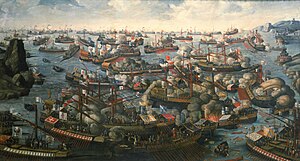Battle of Lepanto
| Battle of Lepanto | |||||||
|---|---|---|---|---|---|---|---|
| Part of the Fourth Ottoman-Venetian War and the Ottoman-Habsburg wars | |||||||
 The Battle of Lepanto, unknown artist, late 16th century |
|||||||
|
|||||||
| Belligerents | |||||||
| Ottoman Empire | |||||||
| Commanders and leaders | |||||||
|
Left: Right: Reserve: |
Ottoman Navy: Center: Sufi Ali Pasha † Right: Mahomet Sirocco † Left: Uluç Ali (Occhiali) |
||||||
| Strength | |||||||
|
212 ships
28,500 soldiers |
251 ships
31,490 soldiers |
||||||
| Casualties and losses | |||||||
| 7,500 dead 17 ships lost |
20,000 dead, wounded or captured 137 ships captured 50 ships sunk 12,000 Christians freed |
||||||
Coordinates: 38°15′N 21°15′E / 38.250°N 21.250°E
![]() Holy League Navy:
Holy League Navy:
Center:
Left:
Right:
Reserve:
212 ships
28,500 soldiers
40,000 sailors and oarsmen
251 ships
31,490 soldiers
50,000 sailors and oarsmen
The Battle of Lepanto was a naval engagement taking place on 7 October 1571 in which a fleet of the Holy League, a coalition of European Catholic maritime states arranged by Pope Pius V, financed by Habsburg Spain and led by admiral Don John of Austria, inflicted a major defeat on the fleet of the Ottoman Empire in the Gulf of Patras, where the Ottoman forces sailing westwards from their naval station in Lepanto (the Venetian name of ancient Naupactus Ναύπακτος, Ottoman İnebahtı) met the fleet of the Holy League sailing east from Messina, Sicily.
...
Wikipedia
